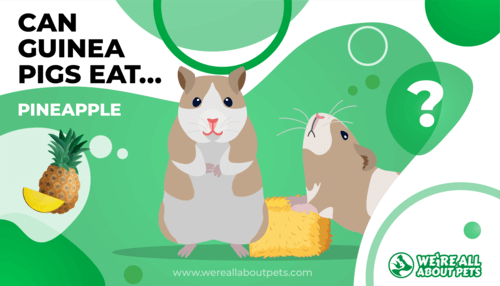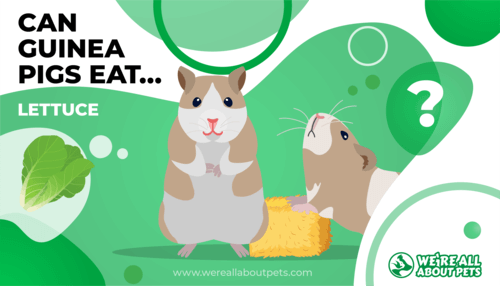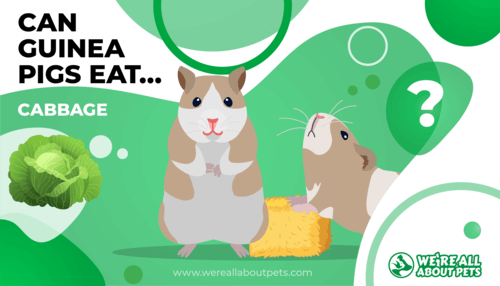Can Guinea Pigs Eat Pumpkin?
This page contains affiliate links. We may earn money or products from the companies mentioned in this post through our independently chosen links, which earn us a commission. Learn More
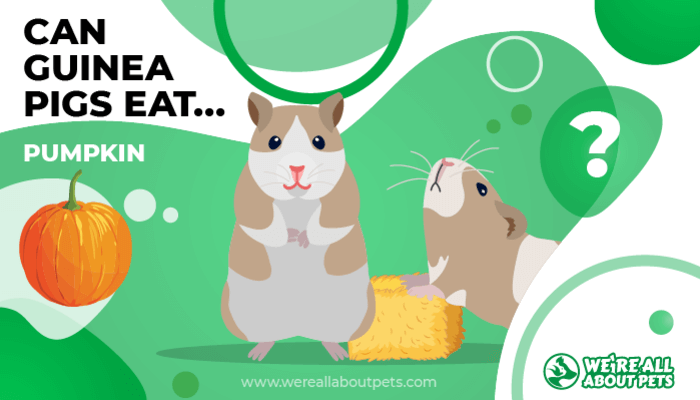
Every autumn, our thoughts turn to pumpkin. Pumpkin spice, pumpkin muffins, and more…they’re all delicious treats!
People have been cultivating pumpkins for thousands of years as food for themselves and domestic animals. It stands to reason, then, that you’re wondering if you can give your guinea pig pumpkin!
The quick answer to the question is yes, but there’s a little more to learn before you offer a pumpkin treat to your pet. For example, how much pumpkin can a cavy eat, and how often can they have it?
What kinds of pumpkin products are safe for guinea pigs? Can guinea pigs eat squash?
No worries – we’ve got you covered with all the answers in our complete guide to pumpkin for guinea pigs!
Pumpkin Nutrition Stats
Even though you might use pumpkin primarily as an ingredient in baked goods, it can be a tasty, nutritious fruit on its own. That’s right – pumpkin and squash are fruits!
A one-cup serving of raw, cubed pumpkin provides approximately:
- 30 calories
- 5 g carbohydrates
- .6 g fiber
- 2 g protein
- .1 g fat
Pumpkin Nutritional Facts
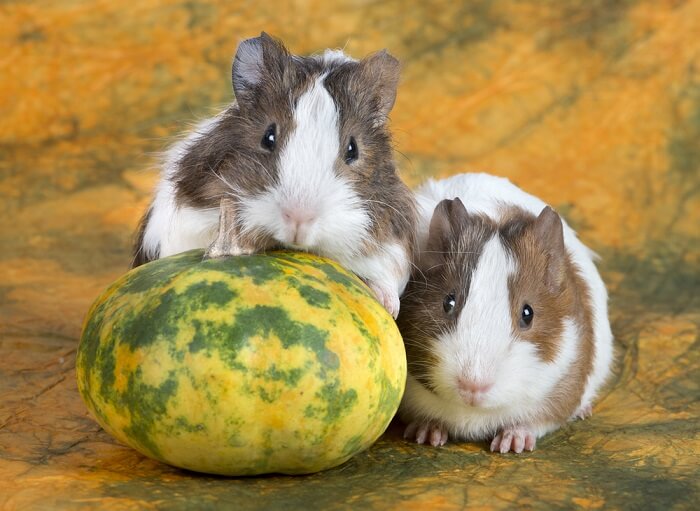
When it comes to vitamin A, pumpkin is a powerhouse. That same single cup of raw diced pumpkin provides about 170% of your recommended daily intake, but that’s not all.
You also get:
- 4 mg vitamin C
- 2 mg vitamin E
- .7 mg niacin
- 3 mcg vitamin K
- 6 mcg folate
- 4 mg calcium
- 9 mg magnesium
- 394 mg potassium
- .4 mg zinc
Pumpkin also contain traces of vitamin B6, thiamine, riboflavin, copper, and manganese.
Can Guinea Pigs Have Pumpkin?
Guinea pigs everywhere are jumping for joy, because the answer to this question is yes! Fresh pumpkin is a great treat for guinea pigs, so if you happen to have any on hand, you can feel free to share.
Is Pumpkin Good For Guinea Pigs?
Since it’s brimming with essential nutrients and as it contains loads of healthy fiber, pumpkin is very good for cavies. Of course, you’ll want to offer only small amounts, and only give your cavy fresh pumpkin.
If a guinea pig eats too much pumpkin at once, negative side effects including gas, bloating, and diarrhea can occur.
Do Guinea Pigs Like Pumpkin?
Lots of cavies like pumpkin – but not all of them do. The best way to see if your guinea pig likes pumpkin is to offer them a sliver of fresh pumpkin and see whether they nibble eagerly, or if they ignore it.
Of course, it can take time for guinea pigs to get used to new foods – particularly if they’re new to your family and you are still building trust.
How Much Pumpkin Can A Guinea Pig Eat?
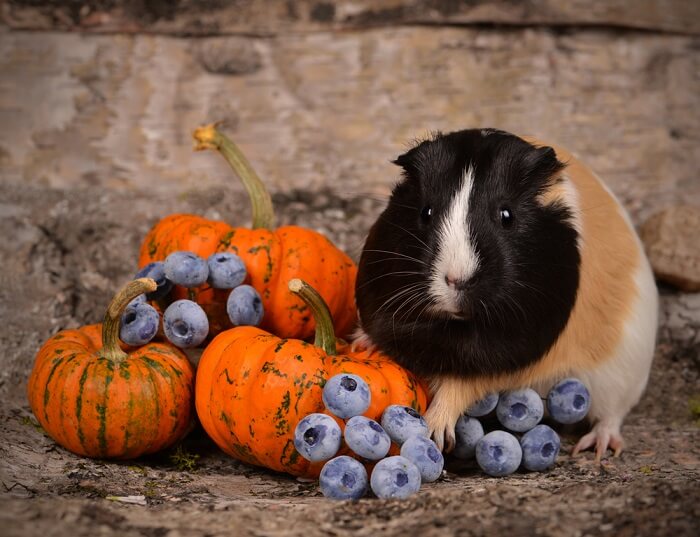
That’s a great question and we’re glad you asked!
Here’s how much pumpkin a to feed your guinea pig:
| Age | Amount |
| Baby guinea pig | None |
| Adult guinea pig | 1 inch cube of fresh pumpkin or winter squash |
Since eating too much pumpkin can cause digestive problems for guinea pigs, it’s very important not to offer more than the recommended amount, even if your cavy loves pumpkin and begs for more!
If this is the first time your guinea pig is eating a crunchy colorful vegetable, you’ll want to watch for signs of indigestion, bloating, and diarrhea for about 12 hours after they’ve enjoyed their treat. Pumpkin and winter squash are safe for guinea pigs so problems are unlikely but can occasionally occur.
How Often Can A Guinea Pig Eat Pumpkin?
Because pumpkin is such a rich food, it’s best to give it to your cavy just two to three times per week. If you’re also feeding your guinea pig winter squash, count each squash treat as a “pumpkin.”
These foods are in the same family, with similar nutritional profiles, so they’re an interchangeable part of your guinea pig’s menu.
The Correct Diet is Important
The natural guinea pig diet might sound boring by human standards, but in the wild, cavies thrive on grasses and leafy plants. You should give your guinea pig a diet similar to what nature intended by offering a continuous supply of fresh Timothy hay, along with a drinking bottle full of clean, fresh water that’s rinsed and refilled every day.
Here’s what else to feed a guinea pig:
- Guinea pig pellets fortified with vitamin C (Check the label for serving size as it varies by brand)
- About one cup of fresh food per day, best split into two to three smaller servings; crunchy and green leafy veggies should be the focus.
- Fresh and clean water everyday!
What Are Other Healthy Alternatives To Pumpkin In A Guinea Pig’s Diet?

As dedicated herbivores, guinea pigs really enjoy a wide variety of veggies and fruits. Your options are nearly endless when it comes time to choose healthy treats for your cavy!
Here’s a list of some popular veggies most guinea pigs like:
- asparagus
- carrot
- carrot tops
- romaine
- beets
- beet tops
- artichoke
- green beans
- cucumber
- bell pepper
- summer squash
- parsnip
- sweet potato
- tomato
- broccoli
- broccolini
- arugula
- swiss chard
- spinach
- endive
- escarole
- cabbage
- basil
- cilantro
- mint
- parsley
- bok choy
- yu choy
- butter lettuce
- buttercrunch lettuce
- bibb lettuce
- rocket
- cabbage
- zucchini
- cauliflower
- brussels sprouts
- watercress
Also Read: What Do Guinea Pigs Eat?
Remember to research new foods – even those that are safe – to make sure that you know how to prepare them, which parts to offer, and how much of each item to give your guinea pig.
It’s an easy way to keep your pet happy, healthy, and engaged!
Now that you’re fully informed on the subject of pumpkin for guinea pigs, why not offer a bit of fresh pumpkin or squash and see if your pet enjoys it?
FAQ
Is pumpkin safe for guinea pigs?
Absolutely! So long as you offer the right amount and don’t feed it more often than recommended, pumpkin is a safe, healthy treat for your cavy.
Can pumpkin make my guinea pig sick?
Even though pumpkin and winter squash are healthy choices, they can make your guinea pig sick if they’re eaten too often or if your cavy has too much at once. The best way to avoid potential problems like gas, bloating, and diarrhea is to give your guinea pig the right amount of pumpkin and/or winter squash no more than three times per week.
Can my guinea pig eat pumpkin leaves and stems?
Yes! Most guinea pigs like pumpkin leaves and stems. It’s important to offer no more than about an inch of pumpkin leaf or stem at a time since these treats are high in calcium. Too much calcium can contribute to kidney and bladder stones.
Can my guinea pig eat pumpkin seeds?
No. Pumpkin seeds are sharp and brittle. They can damage your guinea pig’s teeth, mouth, and throat. Also, pumpkin seeds are high in fat, so your cavy would have a very difficult time digesting them if consumed.
Can my guinea pig eat pumpkin skin?
Yes, it’s OK to leave the pumpkin skin on when you’re offering this treat to your guinea pig.
Can my guinea pig eat cooked pumpkin?
No, guinea pigs can’t eat cooked pumpkin since they can’t digest cooked foods.
Can guinea pigs have pumpkin pie filling?
No, pumpkin pie filling usually has eggs, sugar, and cream in it and none of these are safe for cavies to eat. Save the pumpkin pie filling for your own dessert!
Can guinea pigs eat canned pumpkin?
Canned pumpkin (the kind without additives) isn’t good for guinea pigs because it has been cooked, and your guinea pig’s digestive system can’t handle cooked foods. Don’t give canned pumpkin to your cavy.
Can my guinea pig eat squash?
Yes, squash is good for guinea pigs. You can substitute it for pumpkin, offering a one-inch square up to three times per week. Try:
• Acorn squash
• Banana squash
• Buttercup squash
• Butternut squash
• Hubbard squash
• Kabocha squash
• Delicata squash
• Dumpling squash






